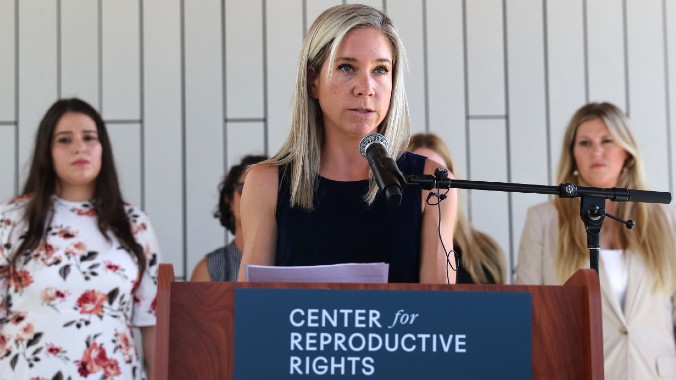Lead Plaintiff in Texas Abortion Lawsuit Is Moving Her Embryos Following Alabama Ruling
“I don’t want them in a state where a similar ruling could very likely take place,” Amanda Zurawski, who's part of an ongoing lawsuit challenging Texas' abortion ban, told NBC.
Photo: Shutterstock Politics
Last week, an Alabama Supreme Court ruling that deemed frozen embryos to be “extrauterine children” prompted several fertility clinics in the state to pause their IVF services. By Friday, as some IVF patients scrambled to try and move their embryos out-of-state, RESOLVE: The National Infertility Association announced that nationwide embryo shipping services had also stopped shipping embryos to and from Alabama due to legal concerns.
Watching this unfold, Amanda Zurawski, the lead plaintiff in an ongoing lawsuit challenging Texas’ abortion ban, revealed that she’s decided to move her embryos out of Texas. “I don’t want them in a state where a similar ruling could very likely take place,” Zurawski told NBC on Thursday. “Everything about IVF is very anxiety-inducing. It’s very scary. It’s very difficult and rulings like this one in Alabama are just adding another layer of fear and anxiety.”
Zurawski is one of two dozen women suing Texas to clarify the medical emergency exception in its abortion ban. She and her fellow plaintiffs accuse the state of almost killing them or severely endangering their health and future fertility by denying or delaying their access to emergency abortion care for their dangerous, nonviable pregnancies. “My heart is broken for every hopeful parent in the state of Alabama and beyond because this isn’t going to stop in Alabama,” Zurawski said. “This is going to have a snowball effect.”
-

-

-

-

-

-

-

-

-

-

-

-

-

-

-

-

-

-

-

-

-

-

-

-

-

-

-

-

-

-

-

-

-

-

-

-

-

-

-

-








































